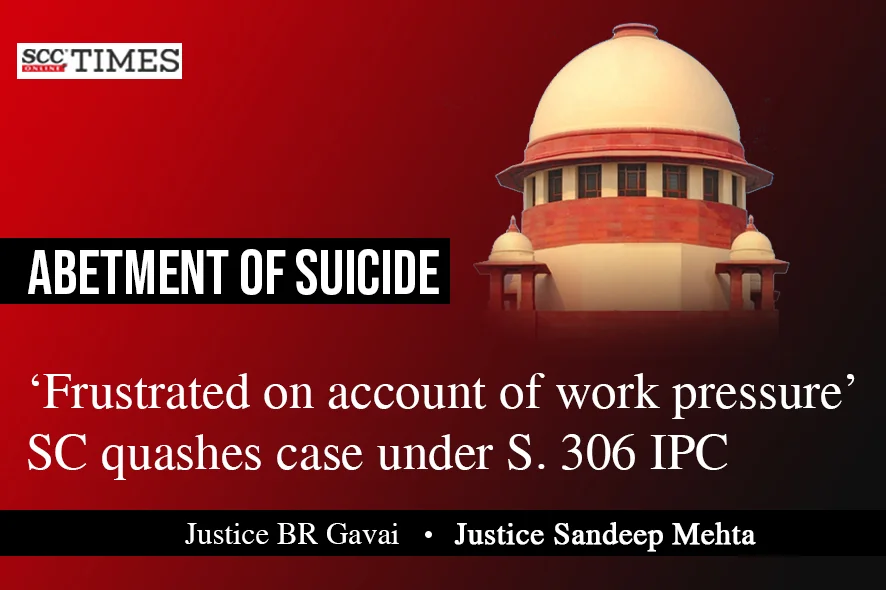Supreme Court: In a criminal appeal against Allahabad High Court’s decision, whereby the criminal application of the accused under Section 482 of the Code of Criminal Procedure, 1973 (‘CrPC’) was dismissed, BR Gavai and Sandeep Mehta, JJ. allowed the appeal and set aside the impugned order.
The accused worked as the District Savings Officer in Kannauj District. The deceased, Senior Clerk, Child Welfare Board, Fatehgarh, committed suicide on 03-10-2002 by consuming a poisonous substance in his own house and wrote a suicide note before ending his life. A first information report was filed based on the suicide note. The Investigating Officer conducted the investigation and filed a closure report. Subsequently, the investigation was re-opened, and a charge-sheet was filed against the accused for the offences punishable under Section 306 of the Penal Code, 1860 (‘IPC’) and Section 3(2)(v) of the Scheduled Caste and Scheduled Tribe (Prevention of Atrocities) Act, 1989 (‘SC/ST Act’). The accused sought quashing of the charge-sheet and proceedings of the criminal case registered against him, however, the said application was rejected by the High Court.
The Court said that the offence under Section 3(2)(v) of the SC/ST Act was ex facie illegal and unwarranted because the prosecution’s case in the entire charge-sheet did not mention that the offence under IPC was committed by the accused upon the deceased based on his caste. The Court said that the necessary ingredients for the offence under Section 3(2)(v) of the SC/ST Act were not made.
On the parameters required to bring an act or omission by the person within the purview of the offence under Section 306 of the IPC, the Court referred to elaborations in Netai Dutta v. State of W.B., (2005) 2 SCC 659 and M. Mohan v. State, (2011) 3 SCC 626. On perusal of the suicide note, which showed that the deceased was frustrated on account of work pressure and was apprehensive of various random factors unconnected to his official duties, the Court said that the apprehensions expressed in the suicide note, and the pressure of working in two different districts, by no stretch of imagination, could be considered sufficient to attribute to the accused, an act or omission constituting the elements of abetment to commit suicide. The Court also said that the contents thereof did not indicate any act or omission on the part of the accused which could make him responsible for abetment as defined under Section 107 of the IPC.
The Court also noted that the investigating agency itself proposed a closure report in the matter after conducting thorough investigation, hence, the Court opined that no justifiable ground existed so as to permit the prosecution of the accused for the offences under Section 306 of the IPC and Section 3(2)(v) of the SC/ST Act. Thus, the Court allowed the appeal and the impugned order passed by the High Court and all proceedings sought to be taken against the accused in the criminal case pending for the offences punishable under Section 306 of the IPC and Section 3(2)(v) of the SC/ST Act were quashed and set aside.
[Prabhat Kumar Mishra v. State of U.P., 2024 SCC OnLine SC 232, Decided on: 05-03-2024]








